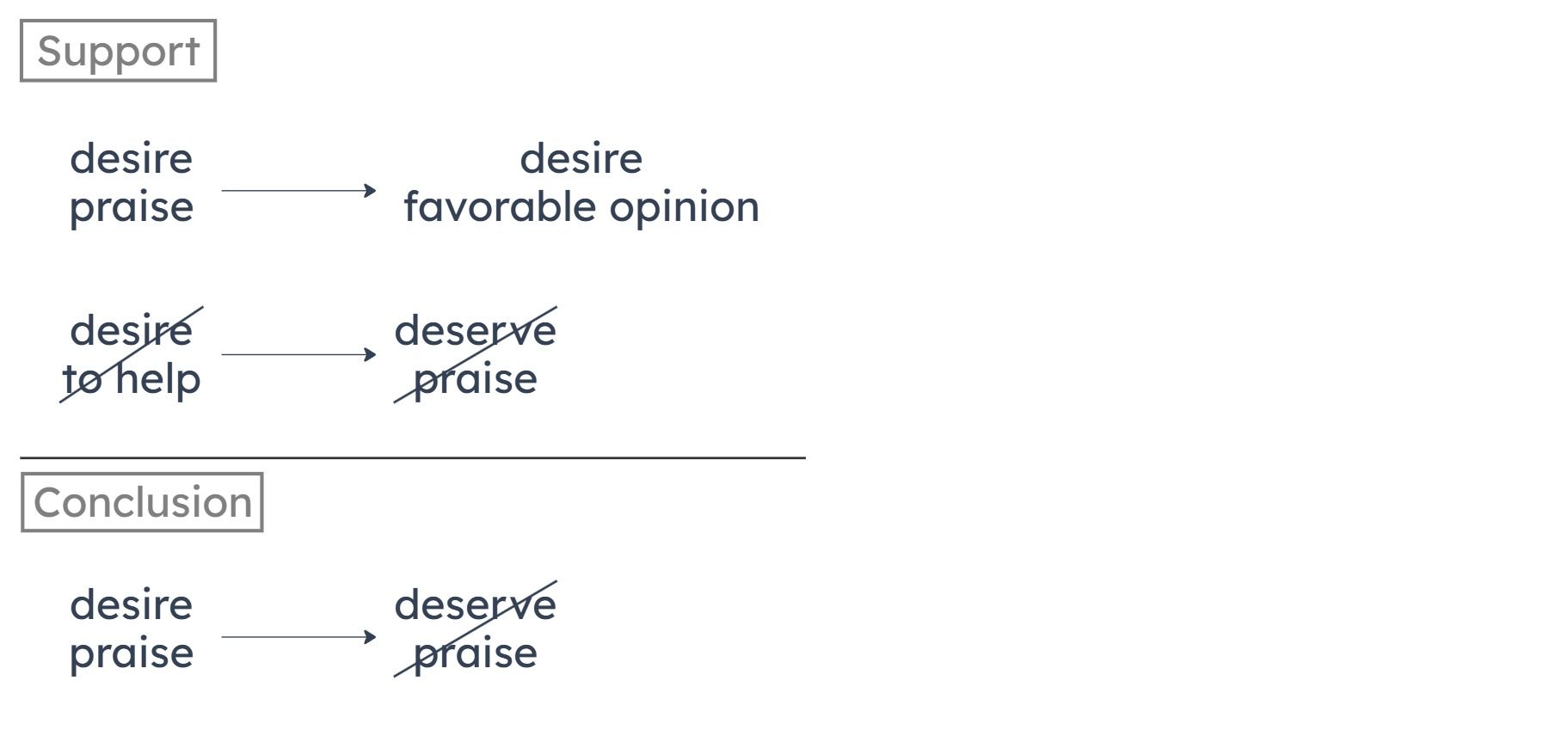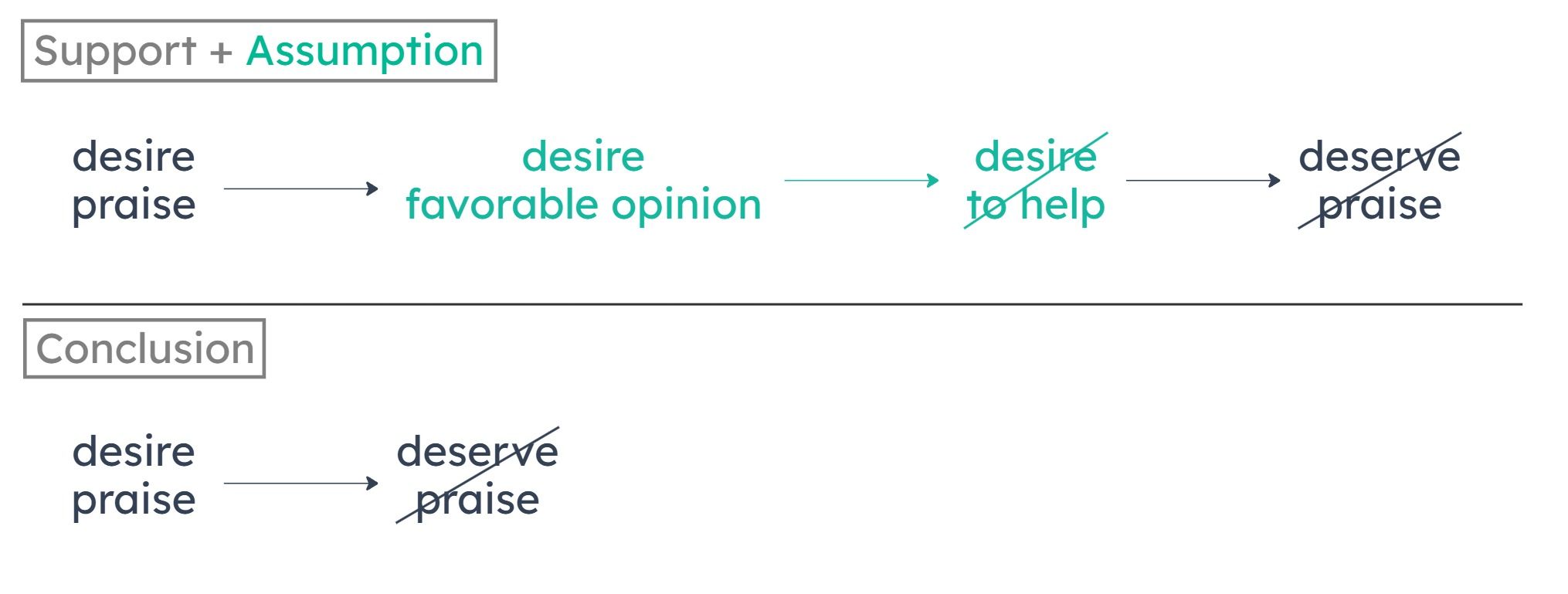LSAT 113 – Section 4 – Question 20
LSAT 113 - Section 4 - Question 20
June 2002You need a full course to see this video. Enroll now and get started in less than a minute.
Target time: 1:32
This is question data from the 7Sage LSAT Scorer. You can score your LSATs, track your results, and analyze your performance with pretty charts and vital statistics - all with a Free Account ← sign up in less than 10 seconds
| Question QuickView |
Type | Tags | Answer Choices |
Curve | Question Difficulty |
Psg/Game/S Difficulty |
Explanation |
|---|---|---|---|---|---|---|---|
| PT113 S4 Q20 |
+LR
| Sufficient assumption +SA Conditional Reasoning +CondR Link Assumption +LinkA | A
50%
162
B
27%
156
C
1%
153
D
2%
152
E
20%
158
|
149 160 171 |
+Hardest | 145.144 +SubsectionEasier |
Summary
The author concludes that people who help others mainly out of a desire for praise do not deserve praise for that help. This is based on the following:
The desire for praise is the desire to obtain the favorable opinions of others.
If someone deserves praise for an action (”merit” = “deserve”), that action must be motivated by a desire to help others.
The desire for praise is the desire to obtain the favorable opinions of others.
If someone deserves praise for an action (”merit” = “deserve”), that action must be motivated by a desire to help others.

Missing Connection
We’re trying to prove that people who help others mainly out of a desire for praise don’t deserve praise for that help. We know from the second premise that in order to deserve praise, the action must be motivated by a desire to help others. So if we can show that people who help others mainly out of a desire for praise are NOT motivated by a desire to help others, that would prove our conclusion.
A
An action that is motivated by a desire for the favorable opinion of others cannot also be motivated by a desire to help others.
The first premise establishes that the desire for praise is the desire to obtain the favorable opinions of others. (A) would establish that helping others mainly out of the desire for praise constitutes an action that is NOT motivated by a desire to help others. This then would connect with the second premise, which takes us to “not deserve praise.”

B
No action is worthy of praise if it is motivated solely by a desire for praise.
The conclusion concerns people who help others “primarily” out of a desire for praise. (B), which tells us that actions motivated “solely” by praise don’t deserve praise, doesn’t cover actions that are done “primarily” out of desire for praise.
C
People who are indifferent to the welfare of others do not deserve praise.
We don’t know that people who help others primarily out of a desire for praise are indifferent to the welfare of others. Maybe they do care about others...it’s just that their action is mainly about getting praise.
D
One deserves praise for advancing one’s own interests only if one also advances the interests of others.
It’s not clear that one who helps others out of a desire for praise is actually advancing their own interests. It’s also not clear that helping others out of a desire for praise wouldn’t advance the interests of others. So (D) doesn’t connect to any of the premises of this argument.
E
It is the motives rather than the consequences of one’s actions that determine whether one deserves praise for them.
(E) establishes that motives determine whether one deserve praise. But (E) allows for actions out of selfish motives, such as desire for praise, to still deserve praise. (E) doesn’t tell us what kind of motive would make an action undeserving of praise.
Take PrepTest
Review Results
LSAT PrepTest 113 Explanations
Section 1 - Reading Comprehension
- Passage 1 – Passage
- Passage 1 – Questions
- Passage 2 – Passage
- Passage 2 – Questions
- Passage 3 – Passage
- Passage 3 – Questions
- Passage 4 – Passage
- Passage 4 – Questions
Section 2 - Logical Reasoning
- Question 01
- Question 02
- Question 03
- Question 04
- Question 05
- Question 06
- Question 07
- Question 08
- Question 09
- Question 10
- Question 11
- Question 12
- Question 13
- Question 14
- Question 15
- Question 16
- Question 17
- Question 18
- Question 19
- Question 20
- Question 21
- Question 22
- Question 23
- Question 24
- Question 25
- Question 26
Section 3 - Logical Reasoning
- Question 01
- Question 02
- Question 03
- Question 04
- Question 05
- Question 06
- Question 07
- Question 08
- Question 09
- Question 10
- Question 11
- Question 12
- Question 13
- Question 14
- Question 15
- Question 16
- Question 17
- Question 18
- Question 19
- Question 20
- Question 21
- Question 22
- Question 23
- Question 24
Leave a Reply
You must be logged in to post a comment. You can get a free account here.